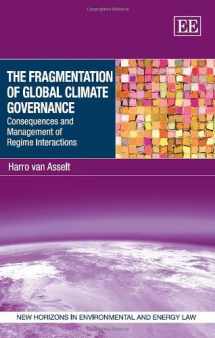
The Fragmentation of Global Climate Governance: Consequences and Management of Regime Interactions (New Horizons in Environmental and Energy Law series)
Book details
Summary
Description
'This book stands out through its insightful conceptual and empirical analysis enlightening the multi-institutional nature of international climate politics. It is an indispensable asset for the bookshelves of all those interested in understanding and managing the fragmentation and complexity of global climate governance.'
- Professor Dr. Sebastian Oberthür, Institute for European Studies, Vrije Universiteit Brussel
'As policymakers embark on the design of an even more comprehensive climate change regime, understanding the way in which existing rules and institutions have interacted will be crucial. Harro van Asselt's analysis provides an essential guide to where we have been and how far we must still go to design a coherent response to a complex and fragmented challenge.'
- Jacob Werksman, Directorate-General for Climate Action, European Commission
'How do the different international institutions addressing climate change interact? What are the actual and potential synergies and conflicts? What are the most effective strategies to manage institutional interplay? Harro van Asselt's expertise in both international law and international relations, as well as his intimate knowledge of the policy-making process, make him ideally equipped to address these fundamental questions. Based on detailed case studies, he provides a wide-ranging, lucid, and theoretically sophisticated study of climate change governance. Essential reading for international lawyers and international relations scholars alike.'
- Dan Bodansky, Arizona State University, US
The fragmented state of global climate governance poses major challenges to policymakers and scholars alike. Through an in-depth examination of regime interactions between the international climate regime and three other regimes (on clean technology, biodiversity and international trade), this book provides novel and timely insights into the various consequences of regime interactions. It also offers a critical discussion of the potential for legal techniques and institutional coordination to foster synergies and mitigate conflicts between regimes in the area of climate change.
Providing an in-depth examination of institutional fragmentation and regime interactions in global climate change governance, this unique book links the literature on institutional interactions and interplay management to the discussions on the fragmentation of international law. It contains the first comparison of different types of interactions and interaction management in the issue area of climate change, and addresses the important role of non-state actors.
This volume will be of great value to students and scholars of global governance and international law.
Contents: Part I: Setting the Stage 1. Introduction 2. The Evolution of Global Climate Governance Part II: Analytical Framework 3. The Concept of Fragmentation 4. Types of Regime Interaction 5. Management of Regime Interactions Part III: Case Studies 6. The UN Climate Regime and Minilateral Clean Technology Agreements 7. The UN Climate Regime and the Convention on Biological Diversity 8. The UN Climate Regime and the World Trade Organization Part IV: Synthesis and Conclusions 9. Regime Interactions in Global Climate Governance 10. Conclusions and Ways Forward Index


We would LOVE it if you could help us and other readers by reviewing the book
Book review



